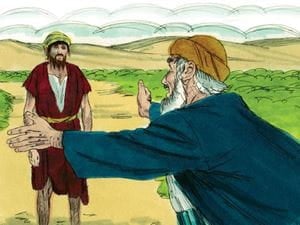
There are several examples of people wandering throughout the Bible. We also deal with the same reality in our daily lives. A few of these examples show up in the Bible when we see people traveling off the road, like the Parable of the Prodigal Son.
This story appears in Luke 15:11-32. The Prodigal Son left home and entered a world of sin. He was broken and wandered away from God. Life wasn’t easy for him when he left home. Luke 15:13-16 says, “Not long after that, the younger son got together all he had, set off for a distant country and there squandered his wealth in wild living. After he had spent everything, there was a severe famine in that whole country, and he began to be in need. So he went and hired himself out to a citizen of that country, who sent him to his fields to feed pigs. He longed to fill his stomach with the pods that the pigs were eating, but no one gave him anything.” In the end, the Prodigal Son returned to the Father, and he accepted him with open arms.
When his Father saw his son for the first time, he celebrated him in the same way God would celebrate His child’s return to Him as a lost sheep. Luke 15:21-22 says, “The son said to him, ‘Father, I have sinned against heaven and against you. I am no longer worthy to be called your son.’ But the Father said to his servants, ‘Quick! Bring the best robe and put it on him. Put a ring on his finger and sandals on his feet. Bring the fattened calf and kill it. Let’s have a feast and celebrate. For this son of mine was dead and is alive again; he was lost and is found.’ So they began to celebrate.” When reading this story, we learn an important lesson about God’s presence. Typically, we think that wandering people are generally lost, but that isn’t always the case.
There are many takeways from the story of the Prodigal Son, particularly lessons of life. Jesus conveyed these messages through parables. What some don’t know is that there is an allegory in the parable. The Prodigal Son addresses different groups of society in various ways. Each of the three main characters in the story represents a different group.
The Prodigal Son represents sinners who are blinded by the sins and pleasures of the world. They disregard the Father’s will in heaven. When they have to deal with the consequences of their actions, they return to the only place where they can find restoration and peace. The Father’s house is their only hope.
The Father represents God. Just like in the parable, our Heavenly Father wouldn’t force a person into His Kingdom. While the Father in the story welcomed his son with open arms, he didn’t compel him to say. Like the Father in the parable, God is hurt when any of His children walk away from Him. However, He still waits at the doors of heaven for our return. God is never resentful. He also isn’t the kind to punish. Our Father in heaven is caring and loving. He will save every one of his children who turn to Him, asking for true repentance. God will give them even more than their heart’s desire. If we look over the story again, we see that the Prodigal Son didn’t want to be anything more than his Father’s hired servant. Yet, he received far more from his Father. He received love and honor from him. He even received a fattened calf, which was killed for celebration. This means the blood of the calf was shed for the sins that were committed. This also may symbolize the blood that Jesus shed for our sins so that we will not perish but have everlasting life.
The older son, who is also a part of the story, symbolizes the Pharisees and teachers of the law. When the Father and the son reunite and begin to celebrate, the older son didn’t have the same reaction. Luke 15:25-30 says, “Meanwhile, the older son was in the field. When he came near the house, he heard music and dancing. So he called one of the servants and asked him what was going on. ‘Your brother has come,’ he replied, ‘and your Father has killed the fattened calf because he has him back safe and sound. The older brother became angry and refused to go in. So his Father went out and pleaded with him. But he answered his Father, ‘Look! All these years, I’ve been slaving for you and never disobeyed your orders. Yet you never gave me even a young goat so I could celebrate with my friends. But when this son of yours who has squandered your property with prostitutes comes home, you kill the fattened calf for him!’” We know that the older son represents the Pharisees because of his attitude and nature. They were the ones who considered themselves superior to others. They were also self-righteous, known to judge right and wrong, good and bad.
In verses 31 and 32 of the same passage, the Father expresses the reason why he accepts his son, “‘My son,’ the Father said, ‘you are always with me, and everything I have is yours. But we had to celebrate and be glad because this brother of yours was dead and is alive again; he was lost and is found.’” The Pharisees are so blinded by the law that they totally miss the will of God. That will is to give forgiveness, kindness, compassion and accept those who are open to receiving God’s grace.
If you are in a place like the Prodigal Son where you are doubtful, restless or questioning your faith, you should think about this takeaway. The truth is, not everyone who wanders is lost. Thankfully, there is hope for any people who take the winding path seeking to find God.

